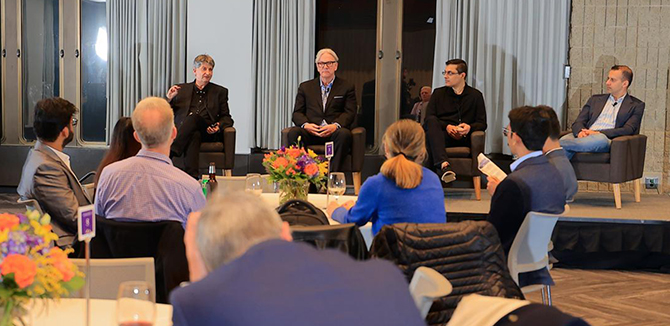Investigating Connected Health
The MEM program’s annual Industry Night focused on how technological advancements will shape the future of healthcare and drew interest from a variety of students, faculty, and alumni.

When Nikhil Raj Nune (MEM ‘24) saw the theme for the 2024 Industry Night, hosted by Northwestern's Master of Engineering Management (MEM) program, he knew he needed to attend.
Nune came to the MEM program with a healthcare consulting background and a deep interest in using technology to improve patient care. That made this year’s focus, “Connected Health,” seem like an event created specifically for him.
“This topic appealed to me because it represents the convergence of my professional experience and my interest in how technological advancements can create a more cohesive and effective healthcare ecosystem,” Nune said. “It offered a unique platform to deepen my understanding of healthcare advancements and explore potential paths in this evolving field.”
Industry Night is an annual MEM event that draws current students, alumni, faculty, and guests for an evening of networking and education. This year’s event featured a panel of four technology and healthcare experts.
- Iqbal Arshad (MEM '97), chief technology officer at Cerence, an artificial intelligence (AI) software company.
- Roozbeh Ghaffari, CEO and co-founder of Epicore Biosystems, a digital health company that develops wearable health devices.
- Rick McNabb, an entrepreneur and key stakeholder in Salt Flats Capital, a private equity company focused on investing in future business models and products.
- Plamen Petrov (MEM '07), CEO at Healee, a digital patient access and medical practice optimization platform.
Arshad and Petrov are both members of the MEM Industry Advisory Board.
Nune said he was excited by the panelists’ optimism about how artificial intelligence (AI) might help revolutionize healthcare.
“Their collective vision emphasized that thoughtful technology deployment can lead to more accessible, efficient, and equitable healthcare solutions,” Nune said. “It was enlightening to see a consensus among such varied experts, unified in their conviction that technology can significantly enhance healthcare delivery and outcomes.”
The global market for AI in healthcare was valued at $11 billion in 2021, according to Statista. That number is expected to boom to nearly $188 billion by 2030.
Nune has a keen interest in what that growth will mean for humans needing health services. He said he shares the panelists’ enthusiasm for what AI could do.
“The synergy between healthcare sectors and technological advancements is paving the way for a future where groundbreaking health outcomes are not just a possibility but a reality,” he said. “The potential to improve diagnostic accuracy by even a fraction of a percent can save hundreds of lives.”
AI’s impact might also automate repetitive tasks to reduce reliance on manual labor, driving down overall healthcare costs. It could also extend the reach of quality care into underserved communities around the world.
The opportunity to learn about topics like these is a major part of what drew Nune to MEM. He said the program stood out for its blend of technology and business that allowed him to sample a broad range of career possibilities.
Industry Night’s networking opportunity also gave him deeper insight into different possibilities.
“The networking portion of the event was a rich source of insights and perspectives, thanks to the diverse experiences of the MEM alumni,” he said. “I engaged in discussions about their career trajectories pre- and post-MEM, which shed light on the myriad paths one can take within the industry. Learning about their day-to-day roles and challenges gave me a better understanding of potential career directions post-MEM.”

